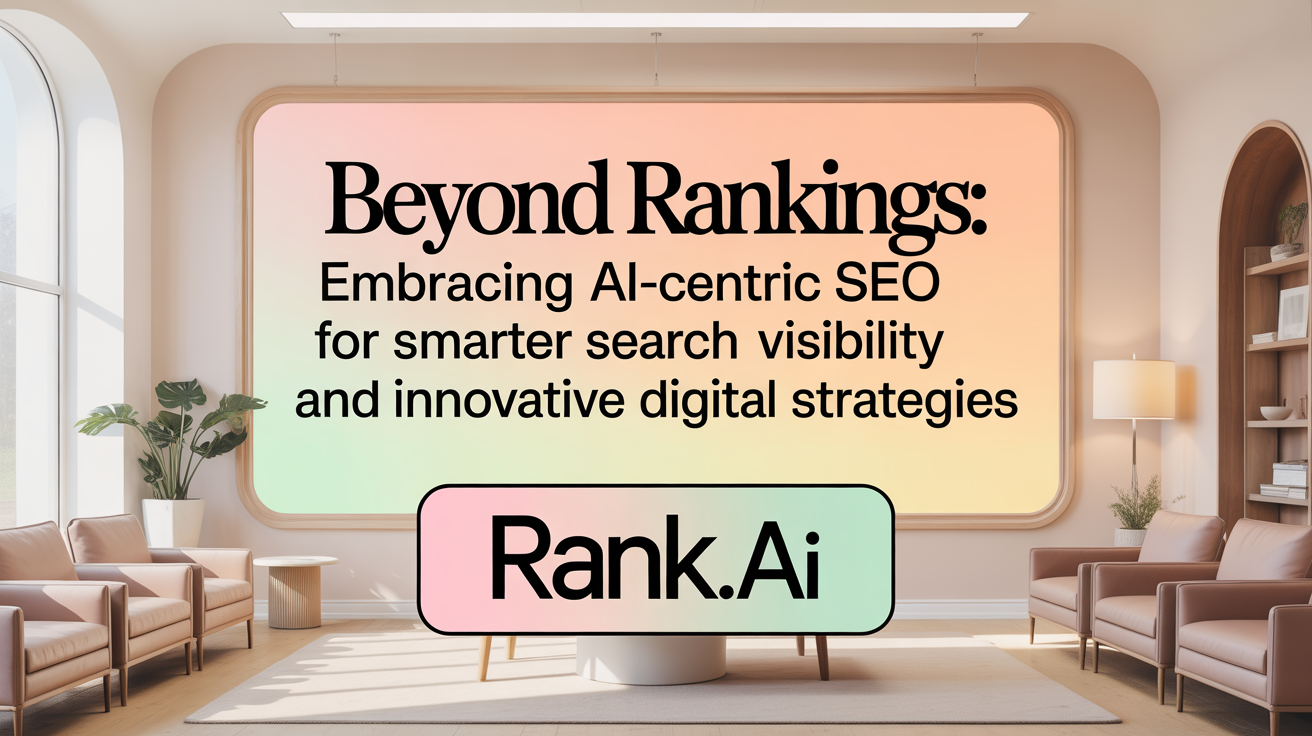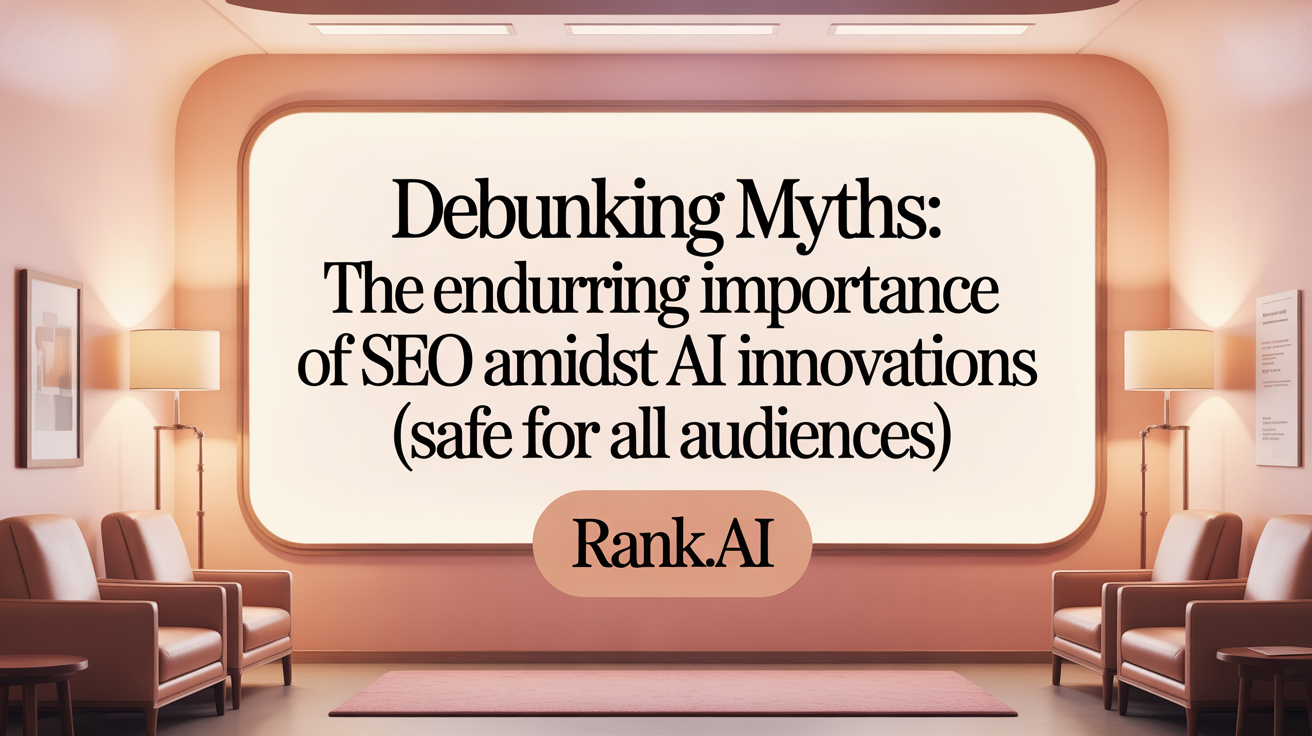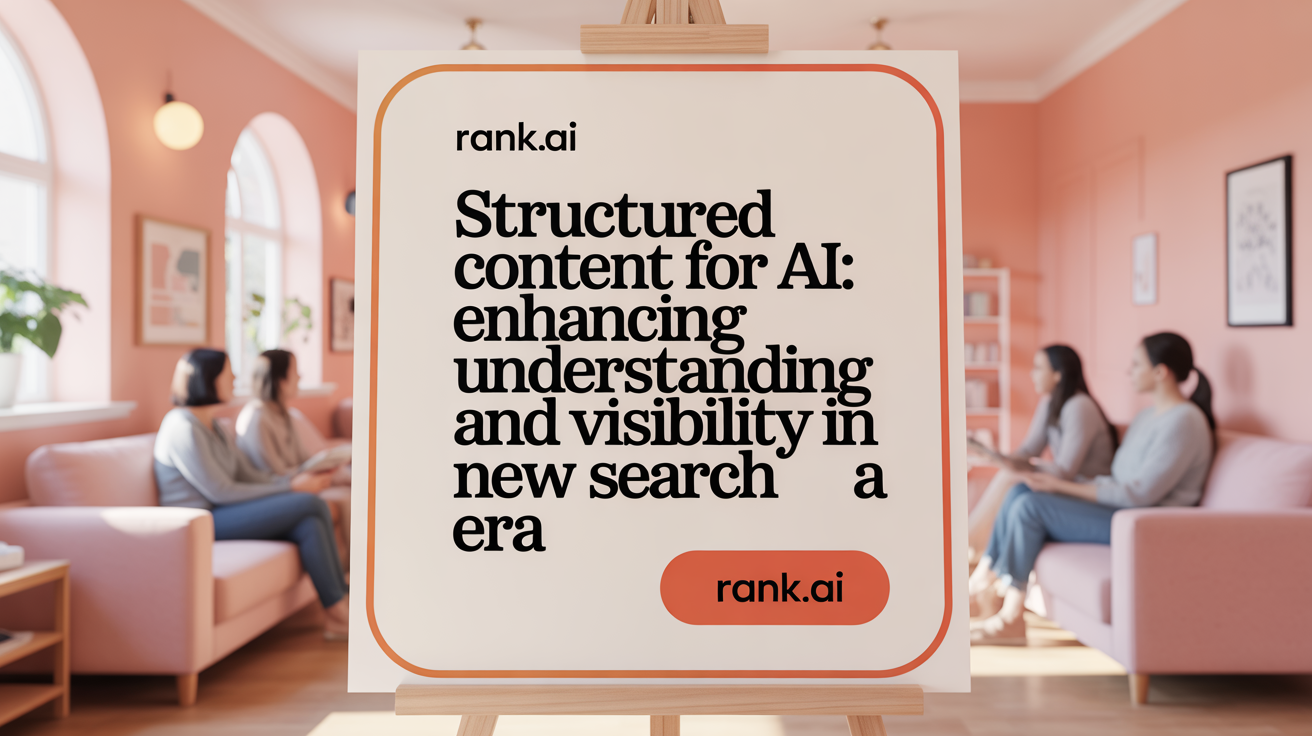Setting the Scene: SEO in an AI-Transformed Landscape
As artificial intelligence reshapes how users search for and consume information online, the traditional SEO landscape is undergoing profound changes. Yet technical SEO remains a cornerstone of visibility and performance in this rapidly evolving environment. Understanding why technical SEO still matters, how it interacts with AI technologies, and what future SEO strategies will look like is essential for marketers, businesses, and content creators aiming to thrive in the age of AI.
Defining SEO in the Era of AI: Beyond Traditional Rankings

How has the concept of SEO shifted with the rise of AI?
SEO today has evolved from primarily focusing on ranking well in traditional search results to optimizing for AI-driven platforms such as chatbots, voice assistants, and generative engines. In this new landscape, the goal isn't just to appear at the top of a link list but to be selected as the authoritative source that AI models can confidently reference and summarize. This shift demands creating content that is clear, structured, and conversational, enabling AI algorithms to easily understand, evaluate, and include it in their summaries or answer snippets.
How are AI platforms like ChatGPT and Gemini influencing SEO strategies?
As AI tools like ChatGPT, Bard, and Gemini become more prevalent sources for quick answers, businesses must think beyond traditional search engine optimization. These platforms pull data from highly authoritative, well-structured content, emphasizing the importance of comprehensive, high-quality information. To stay visible, brands should focus on crafting content that is not only optimized for search rankings but also structured to be easily cited and summarized by AI—for instance, through clear headers, FAQs, and schema markup.
Why is the focus shifting to conversational and structured content?
AI models excel at processing natural language and assessing the relevance of content based on clarity and context. Content formats such as FAQs, bullet points, and structured data increase the likelihood of being featured in AI-generated summaries. Additionally, structured data markup helps AI systems interpret the content's intent and context more accurately. This means that websites need to adopt a more natural, conversational tone in their content to align with the way AI understands and responds to user queries.
What new content formats are important in this AI-driven era?
In the evolving search environment, formats like FAQs, how-to guides, and other structured content are now vital. Implementing schema markup and real-time content optimization ensures that search engines and AI models can easily comprehend and reference your content. These formats also improve the chance of being featured directly in AI outputs, voice search results, or quick overview snippets, increasing visibility.
How can businesses maintain visibility across AI platforms like ChatGPT and Gemini?
To stay consistent across these platforms, brands should ensure their content is authoritative, well-organized, and regularly updated. Building trustworthiness through credible sources, expertise, and a solid site architecture—aligned with E-A-T principles—is essential. Additionally, leveraging structured data, maintaining high site speed, and optimizing for mobile usability remain critical. By blending traditional SEO tactics with AI-centric strategies, businesses can safeguard their visibility in a landscape dominated by AI-driven information exchange.
| Strategy Aspect | Traditional SEO Focus | AI-Driven Focus | Implementation Methods |
|---|---|---|---|
| Content Optimization | Keyword use, backlinks, rankings | Structured, conversational, and authoritative content | FAQs, schema markup, clear headers, human-like language |
| Content Formats | Articles, blogs | FAQs, how-to guides, summaries | Schema, real-time updates, natural language style |
| Site Technical Aspects | Crawlability, loading speed, mobile-friendliness | Accessibility, schema, high site performance | Core Web Vitals, HTTPS, mobile design |
| Visibility & Trust | Domain authority, backlinks | Credibility, E-A-T, content citations | Reputable sources, author reputation, trustworthy data |
| Content Updates | Regular updates for rankings | Freshness for relevance and AI relevance | Content review calendar, real-time content adjustment |
Staying ahead in SEO in the AI era entails a blend of traditional practices and new approaches centered on structured, user-friendly, and authoritative content. As AI continues to shape search experiences, adapting strategies to meet these emerging standards will be crucial for ongoing visibility and success.
The Enduring Pillars: Why Technical SEO Remains Essential
Why is technical SEO still important in the age of AI and advanced search technologies?
Technical SEO continues to be a fundamental element of a successful digital strategy, even with the rise of AI and smarter search algorithms. Its primary role is to ensure that websites are accessible, fast, and easy for both users and search engines to understand.
As Google and other search engines incorporate sophisticated AI models such as BERT and MUM, they heavily depend on clear technical signals to interpret website content accurately. Structured data like schema markup helps AI systems grasp the context and meaning of web pages, increasing the chances of content being featured in AI-generated summaries or snippets.
Page speed is crucial. Fast-loading sites keep users engaged and are favored in rankings, especially with Google's Core Web Vitals becoming official ranking factors. Mobile optimization is equally vital, given the increasing volume of searches conducted on mobile devices.
Secure connections (HTTPS) not only protect user data but also build trust and improve ranking potential. These technical signals collectively enable AI systems to crawl, understand, and interpret content effectively, ensuring that high-quality content gets properly indexed and surfaced.
Furthermore, ongoing technical site updates help maintain relevance and authority. Regular audits detect issues like crawl errors, broken links, or slow performance, which could hinder visibility.
In short, technical SEO acts as the backbone of digital presence. It supports content relevance, enhances user experience, and ensures that AI-driven search systems can accurately assess and rank websites. Without solid technical foundations, even the best content may remain undiscovered in an increasingly AI-powered search landscape.
| Aspect | Importance | Details |
|---|---|---|
| Accessibility & Speed | Crucial | Ensures site is reachable and loads fast for all users |
| Core Web Vitals | Ranking factor | Measures loading, interactivity, visual stability |
| Schema Markup | Contextual understanding | Helps AI interpret content purpose and sentiment |
| Secure Connections | Trust & ranking | Protects data and signals credibility |
| Site Architecture | Crawlability | Guides search engines efficiently through content |
| Continuous Optimization | Relevance & visibility | Adjusts for evolving algorithms and user behavior |
Staying on top of these technical aspects ensures your website remains competitive, discoverable, and trusted in the AI-enhanced search environment of 2024 and beyond.
How AI has Transformed SEO Practices and User Expectations

How has SEO changed since the emergence of AI?
Since the rise of AI in search, SEO has evolved from simple keyword matching to a more sophisticated understanding of user intent and context. Search engines now leverage machine learning and natural language processing (NLP) to interpret queries more accurately, favoring content that offers comprehensive, authoritative, and relevant information.
This shift means that traditional tactics like keyword stuffing and superficial optimization are less effective. Instead, content creators focus on delivering high-quality, well-structured content that addresses users' needs clearly and thoroughly. AI-driven insights also enable marketers to develop more strategic SEO approaches centered on user engagement and trust.
In addition, AI has made SEO more data-driven. Marketers analyze extensive user behavior data, search trends, and content performance metrics to refine their strategies continually. As a result, SEO today emphasizes genuine relevance, experience, and expertise—aligning content with what users are actively searching for. Overall, AI has shifted SEO towards creating more valuable, contextually aware, and user-focused websites, enhancing the overall search experience.
Impact of Technical SEO on AI-Driven Search Visibility and Rankings
How do technical SEO practices impact search visibility and rankings in an AI-driven search landscape?
In today's AI-powered search environment, technical SEO plays a crucial role in ensuring websites are easily discovered, understood, and prioritized by search engines. When websites are well-structured, fast-loading, and mobile-friendly, AI algorithms can efficiently crawl and interpret their content. This is vital because AI systems like Google’s BERT and MUM depend on understanding content context and relevance, which is facilitated by sound technical foundations.
Effective technical SEO includes implementing schema markup and structured data, which help AI recognize and categorize content accurately. For example, schema can signal the type of information a page contains—such as FAQs, reviews, or articles—making it more likely to be featured in AI Overviews or snippets. Moreover, elements like site speed, optimized code, and accessible content not only improve user experience but also strengthen a site’s credibility in AI's evaluation process.
As AI-driven search features such as generative summaries and answer snippets become more prevalent, having authoritative and well-organized content ensures higher chances of being included in these responses. Technical SEO also supports future-proofing by accommodating advances in natural language processing, voice search, and multimodal content, which rely heavily on well-structured data and accessible content.
In summary, robust technical SEO is foundational to maintaining high visibility and rankings in an evolving AI search landscape. It bridges the gap between content quality and search engine understanding, enabling websites to effectively compete and be featured in AI-generated responses.
Addressing Misconceptions: Will AI Make SEO Obsolete?
 Although AI is revolutionizing search results by offering summaries and conversational answers, it does not render traditional SEO practices unnecessary. Search engines still depend heavily on indexing, relevance, and understanding user intent to deliver accurate results.
Although AI is revolutionizing search results by offering summaries and conversational answers, it does not render traditional SEO practices unnecessary. Search engines still depend heavily on indexing, relevance, and understanding user intent to deliver accurate results.
Today’s search engines, including Google and Bing, are blending AI-generated summaries with traditional results. This fusion means that optimizing for relevance, authority, and structured content remains crucial.
AI’s role primarily involves automating tasks like keyword research, content analysis, and site optimization. However, it does not replace the strategic input of human experts. Content quality, ethical considerations, and originality are areas where human judgment is irreplaceable.
To succeed, SEO must evolve. Emphasizing authoritative content, using structured data, and ensuring fast, mobile-friendly sites are still vital. Adapting to the AI-driven landscape involves creating clear, valuable, and well-organized information that both search engines and AI tools can understand.
In summary, SEO is not becoming obsolete; rather, it is transforming. With ongoing innovation and strategic focus, SEO will continue to thrive alongside AI, helping websites maintain visibility and trustworthiness in a more intelligent search environment.
Harnessing AI and SEO Together for Effective Digital Marketing
What are best practices for combining AI and SEO to build effective digital marketing strategies?
In today’s competitive online environment, integrating AI with SEO has become essential for crafting successful digital marketing strategies. One of the foundational practices is leveraging AI tools to conduct in-depth keyword research. AI can analyze search intent, identify trending topics, and uncover long-tail keywords that traditional methods might overlook.
Optimizing on-page elements is also streamlined through AI. Content suggestions for headings, meta descriptions, and semantic relevance can be automated, ensuring your site aligns with user queries. At the same time, maintaining robust technical SEO is crucial. This involves ensuring fast site speed, mobile friendliness, and implementing schema markup to help search engines understand your content better.
AI-driven insights can significantly enhance link-building efforts and competitor analysis, giving your site authority and visibility in local markets. Routine tasks such as site audits and content updates can also be automated with AI, freeing up time to focus on strategic planning.
Personalization is another benefit. AI enables customization of user experiences based on behavior patterns, increasing engagement and conversions. However, human oversight remains vital to ensure content quality, brand voice, and ethical standards are upheld.
By staying adaptable and continuously updating strategies based on AI insights and evolving search algorithms, digital marketers can create resilient, effective campaigns that stand out in the digital landscape.
Future-Proofing Technical SEO in an AI-Driven Search Ecosystem

How will technical SEO evolve to stay relevant alongside AI innovations in the future?
As AI continues to refine how search engines interpret and rank content, the role of technical SEO will expand beyond traditional factors. Future SEO strategies will heavily rely on advanced AI tools for analytics, automation, and insights into user behavior. These tools will allow SEO professionals to quickly identify and fix issues, optimize content dynamically, and personalize user experiences at scale.
With the emergence of AI-generated answer engines and features like Google’s AI Overviews, the focus of SEO will shift from simply ranking high in traditional results to establishing authority and trustworthiness. Content will need to align with E-E-A-T principles—Experience, Expertise, Authority, and Trustworthiness—to be favored in AI-driven snippets.
Given the rise in zero-click searches and personalized AI responses, optimizing for user intent and delivering original, valuable content will be more critical than ever. SEO will also involve enhancing multi-channel visibility, including voice, visual, and video search, requiring a holistic, user-centric approach.
Ultimately, SEO in the future will be characterized by continuous adaptation, ethical practices, and data-driven decision-making. Keeping pace with AI innovations and integrating these tools into everyday workflows will be essential for maintaining relevance and ensuring long-term visibility in an evolving search landscape.
Optimizing Content and Site Structure for AI Compatibility

Using schema markup and structured data to improve AI understanding
In the era of AI-powered search, schema markup and structured data are vital for helping AI systems interpret website content accurately. Implementing schema enables search engines to grasp the context and relationships within your content, increasing the likelihood of featured snippets and appearances in AI-generated overviews. Properly structured data can include information like articles, reviews, products, and FAQs, making your pages more accessible and understandable to AI.
Crafting authoritative, clear, and well-organized content
Search engines favor content that demonstrates expertise and authority. Creating well-organized content with clear headings, logical flow, and authoritative sources boosts your chances of being prioritized in AI summaries. Incorporate thorough analysis, original insights, and deep explanations to satisfy both users and AI systems, aligning with the shift toward valuing quality over quantity.
Aligning with AI preferences for original insights and in-depth analysis
AI systems prefer content that provides unique perspectives and comprehensive coverage of topics. Focus on delivering in-depth, well-researched information that adds value beyond basic facts. This not only helps your content rank higher but also increases the chance of being featured in AI summaries and voice search responses.
Improving site speed and mobile usability for better engagement
Performance factors like fast page load times and mobile-friendliness remain crucial. AI tools and search engines prioritize sites that offer a seamless user experience, which encourages engagement and reduces bounce rates. Optimize images, leverage browser caching, and ensure your site is fully responsive to enhance usability and visibility.
Addressing changes like zero-click searches and user behavior shifts
With nearly 60% of searches resulting in zero-click interactions, it's essential to optimize for brand authority and content that influences users' decision to click through. High-quality, structured, and trustworthy content enhances your chances of gaining visibility, even if users find answers directly within search results. Staying current on AI-driven trends and adapting strategies accordingly ensures sustained search presence.
Preserving Technical SEO’s Vital Role Amid AI Advancements
While AI technologies and generative search platforms are reshaping how users find information, technical SEO remains indispensable for ensuring that websites are accessible, understandable, and user-friendly. The integration of structured data, fast loading times, mobile optimization, and authoritative content not only supports AI algorithms in indexing but also enhances real user experiences. SEO is evolving, embracing AI-driven insights and tools, but it is far from obsolete. Instead, it is adapting to empower marketers and businesses to maintain their visibility and competitive edge in an increasingly AI-augmented search landscape. As AI continues to influence search engines and user behavior, the foundational principles of technical SEO will remain crucial in crafting digital strategies that deliver sustained success.
References
- Why SEO Still Matters in the Age of AI | RivalMind
- Is Technical SEO Still a Must in the AI Era? - Octiv Digital
- SEO in the Age of AI: Impact of AI on SEO - WSI Digital Marketing
- Why SEO Still Matters in the Age of AI | Latitude Park
- Is SEO Dead in the Age of AI? - Big Drop Inc
- SEO In The Era of AI: Why It Matters | Web Design Services
- Your website still matters in the age of AI - Search Engine Land
- Winning with SEO in the Age of AI - Hoot Host
- Why Content and SEO Are Still Vital in the Age of AI
- The Future of Search: Adapt Your SEO Strategy In The Age Of AI



